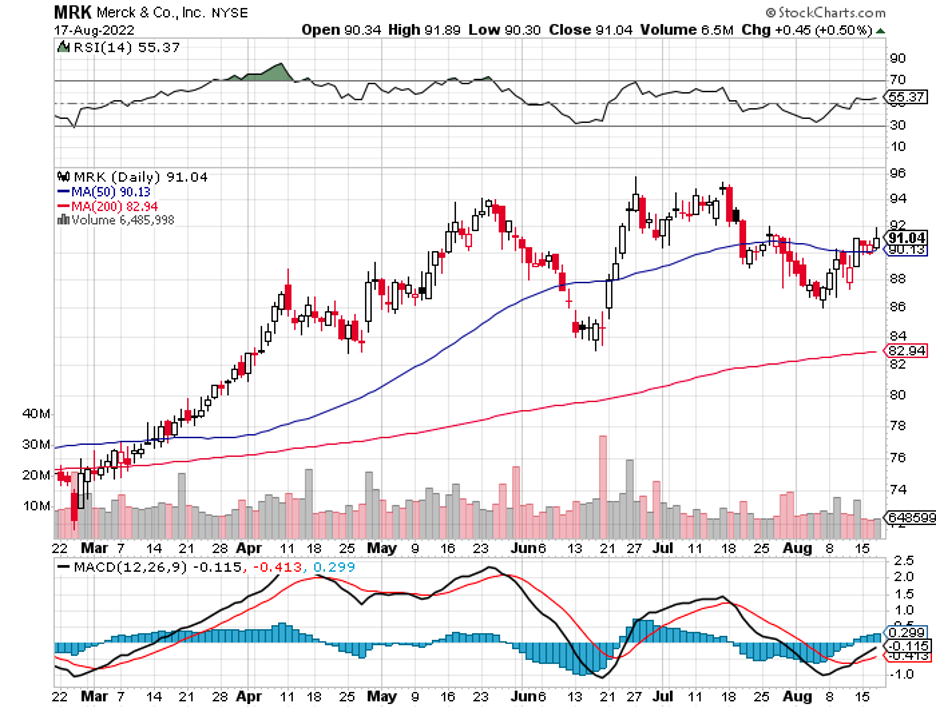More Than Just A One-Trick Pony
When executed correctly and sufficient time is allocated, stock market investing can be highly rewarding. But, what can investors do to make the most of their opportunities in the market?
The short answer: Choose businesses that have or are building a strong competitive advantage.
Those investing in the biotechnology and healthcare sector know that buying companies with promising portfolios and diverse pipelines is vital.
After all, a solid lineup can generate and secure steady cash flow to fund R&D efforts as well as acquisitions to expand the pipeline. Consequently, this guarantees steady growth in revenues as existing products face patent exclusivity losses.
Within this sector, one of the companies with a strong portfolio and promising pipeline is Merck (MRK).
Merck has become practically synonymous with Keytruda—the #1 cancer drug in terms of sales globally. In the first 6 months of 2022 alone, this drug already raked in $10.1 billion in sales.
While several biotechnology companies would be content with this top-tier drug in its portfolio, Merck refuses to be a one-trick pony.
Leveraging its $222 billion market capitalization, the fifth-biggest pharmaceutical company on the planet has been steadily expanding its portfolio.
In fact, Keytruda only made up 33% of its total $30.5 billion sales in the first half of the year.
Merck has built a formidable oncology lineup and developed several blockbuster treatments in this space.
Its flagship, Keytruda, climbed 30% year-over-year in its second-quarter earnings report to record $5.3 billion for that period. Other cancer treatments improved their performance as well. Lynparza grew 17% while Lenvima rose 33%.
Amid these growths, Merck remains aggressive in expanding its oncology lineup. Earlier this year, the healthcare world has been abuzz with Merck’s plan to buy cancer-centered biotech Seagen (SGEN).
The deal, if it pushes through, would be reportedly worth $40 billion and add 4 already approved cancer drugs to Merck’s portfolio.
On top of these market-ready products, Seagen will also bring numerous late-stage candidates to the table.
Merck also recently inked a smaller deal with Orion Corporation. The agreement, worth $290 million, will grant Merck access to Orion’s drug candidate for prostate cancer.
Meanwhile, Merck just announced its plan to catch up with its peers in the COVID-era race. Specifically, the biotech giant has finally become more invested in entering the messenger RNA technology segment.
Earlier this week, Merck struck a $3.7 billion deal with Cambridge-based private biotech Orna Therapeutics for the latter’s novel take on mRNA called oRNA.
Basically, Orna’s approach involves altering the mRNA strands in such a way that it creates a circle instead of a line.
According to the firm, this will be a more effective way to apply the technology to mRNA-based vaccines and therapies.
This isn’t the first time Merck collaborated with a smaller firm to pursue mRNA technology.
As early as 2015, Merck has already been investing in this segment. In fact, it was one of the early partners of Moderna (MRNA), signing a series of agreements with the latter including collaborations on infectious diseases programs.
While some of the programs have been discontinued, Merck and Moderna continue to work together on a personalized cancer vaccine program.
Amid these efforts, Merck is still regarded as a laggard compared to its Big Pharma peers in terms of making huge investments in the mRNA space.
Recent mRNA collaborations include Sanofi’s (SNY) $3.2 billion deal with Translate Bio, Pfizer’s (PFE) massive investment in BioNTech’s (BNTX) technology, and GlaxoSmithKline’s (GSK) deal with CureVac (CVAC).
Nevertheless, the deal with Orna suggests a shift with Merck’s strategy.
Overall, Merck is a premier biotech and healthcare business with a strong portfolio and a promising pipeline.
Its profitability and expansion over the past years have been proven to be top-notch, and it’s not farfetched to expect the same or even better results in the future. I recommend buying the dip.

